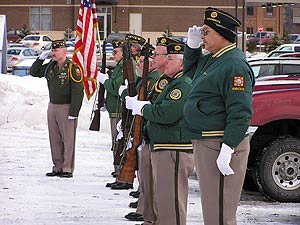|
Audio
Photos
|
Duluth, Minn. — A chill wind whips across the parking lot behind a Duluth memorial chapel. Over by the cars, a row of soldiers in uniform, armed with rifles - the standard M-1 used for a gun volley salute in thousands of funerals across America.
The guns crack loudly in three volleys. The mournful sound of taps follows. And the soldiers march away.
Take a close look and you'll see grey hair and weathered faces that hint that these guys have been doing this job for many years.
Lyle Berg says the Duluth combined honor guard is constantly on funeral duty.
"As many as seven in one week, where we have one on Monday, maybe three on Wednesday, four of 'em on Saturday," Berg says. "You can't get four squads. It's not possible."
John Marshall is a relative spring chicken compared to the squad. He's a Gulf War veteran and head of the Duluth Combined Honor Guard - 35 American Legion and VFW post veterans.
"We've got an 86 year old man," Marshall says. "We've got an 89 year old man. The average age I would say, in mid-70's."
Like the veterans they honor, the honor guard is slowly dying off. And very few young people are joining up. So Marshall wondered if another organization could help.
"We asked the sons of American Legion, which is an auxiliary unit of the American Legion," Marshall says.
But that's where Marshall ran into classic Army red tape. The rifles belong to the Army. They're loaned to American Legion and VFW posts. And you can't loan a rifle to a member from any other group.
"The American Legion cannot use VFW rifles," says Marshall. "VFW can't use Legion Rifles. As separate organizations we just don't have enough men to provide rifle squads."
Marshall found that many posts were already bringing in volunteers from unauthorized organizations; an apparent violation of federal law. So he took the problem to Congress - at least to Congressman Jim Oberstar's Duluth office. That's where he found Dave Boe. Boe is on Oberstar's staff and is a fellow veteran.
"This problem is a reflection of the whole overall problem nationwide, with veterans groups that are losing memberships," says Boe.
Boe admits that many younger guys, like himself, just don't have the time.
"I'm a member of the American Legion," says Boe. "But, you know, I've got a family; job; other commitments. It's hard for me to find time to be on an honor guard, let alone go to the meetings."
Boe contacted Ed Woolverton. He manages the Army's rifle loan program. The law, Woolverton said, wasn't in John Marshall's favor.
"The law says we are allowed to loan rifles to veterans organizations for use by that organization, which basically means, they're not supposed to loan them to anybody else," Woolverton says.
Even though they were getting loaned to others, in many places. Woolverton had been looking the other way.
Meanwhile, the story hit the papers - first in Duluth - and then all over the place: The Washington Post, the Army Times - even Great Britain's Guardian newspaper.
Pretty soon, Army staff attorneys found an opening.
"We re-evaluated what the rules were, and came to the happy conclusion that yes, the entire family of veterans organizations were authorized to use the rifles," says Woolverton.
In Duluth, John Marshall says, the change was immediately evident.
"Right now, we've brought in at least eight new members," Marshall says. "And we have a meeting on February 7th, and we have at least a half dozen; eight Sons Of American Legion members that are interested in joining; so I'm looking at probably 15 to 20 men at a minimum here by our next honor guard meeting."
So now that David has slain Goliath, you might think John Marshall would be done. But he's not. There's a little issue with the State of Wisconsin not paying a stipend to Minnesota honor guards when they work a Wisconsin funeral. Wisconsin lawmakers can expect to be hearing from Marshall soon.






